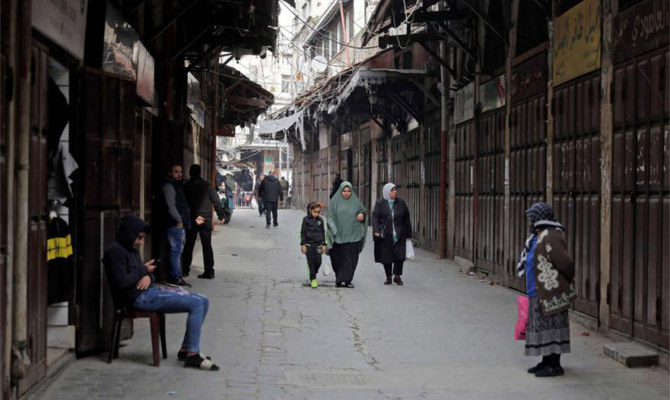Mohamed Chebaro
The people living in Lebanon, like those in Syria, Turkiye and across the Eastern Mediterranean, have been feeling the tremors and aftershocks of the earthquakes that have struck the region over the last two weeks. Though the season of natural tremors seems to be unrelenting, the Lebanese have also been regularly waking up to developments that are human-made, which have been rocking their daily lives amid the constant spiraling descent of the country into the political, economic and social abyss.
When renewed tremors were felt in the capital Beirut on Monday evening, people used the stairs to escape the buildings they live in and rushed to open spaces. They did not need reminders from the civil defense agency not to use the lifts, as they rarely see the supply to the power grid connected. The lifts stand idle or rely on expensive ad hoc generator supply, costing households between $100 and $300 per month to get 10 to 12 hours of electrical supply daily, as the country’s treasury often has no funds to buy fuel to power its electricity generation.
Like most responsible governments, the Lebanese authorities ought to rush to inspect any damage to critical infrastructure as a result of the two weeks of tremors felt in various parts of the country. But most municipalities and public works sectors lack the necessary access to fuel and funds to carry out their critical missions.
Every family in Lebanon has a small bag packed with passports, essential paperwork and deeds of ownership, if they are lucky, as well as money to see them through in case things take a turn for the worse. These bags recently had to be modified, as the devalued Lebanese lira meant that families had to resort to larger bags to hold extra banknotes due to the currency’s meager value. It continues to hit record lows against the US dollar, with $1 now worth about 82,000 lira.
The earthquakes may not have hit Lebanon directly, but the suffering felt in the country as a result of the political void and stalemate are too great for any citizen to withstand. Banks this month decided to close their doors in protest after many court investigations resumed that could destroy a sector that has long been part of Lebanon’s many prosperity tools, despite the sector’s many shortcomings. In Lebanon nowadays, people are no longer scared of earthquakes, as families throughout the country bear the brunt of the crisis. They suffer from the incredible rise in the cost of living, ballooning inflation and a lack of employment, while teachers and nurses are not earning enough to afford to reach their places of work, with many relying on handouts to subsist.
Any rescue plans to deal with the impact of the many human-made earthquakes that have battered Lebanon for several years now are handicapped by the ongoing political stalemate and the failure of the political elite to agree on a vision to run the country amid a local and regional alignment that has resulted in a void in the upper echelons of power. Lebanon continues to fail to elect a president of the republic and the caretaker government lacks the necessary constitutional and operational powers to fill the void. The parliament, meanwhile, has merely been tasked with the simple act of sitting in sessions dedicated to electing a president. However, it often lacks a quorum or some of its members prefer to vote with a blank piece of paper as a means to apply pressure and impose their preferred candidate. The root causes of the human-made earthquake in Lebanon – a formerly middle-income country – are, by the admission of senior politicians themselves, the decades of profligate spending and corruption that led the financial system, the main lender to the state, to collapse. Even before the latest wave of natural tremors, three out of four Lebanese experienced stress “a lot of the day,” which is a new high after 16 years of pollster Gallup measuring this trend. In the same poll, 63 percent of Lebanese adults said they would like to leave the country permanently.
Many Lebanese have been living on family remittances of about $200 per month, along with handouts from ever-dwindling charity cash, leaving them unable to send their children to school, access healthcare or medicine, or afford more than one meal a day, with even that often donated by local charitable organizations. Lebanon’s crisis continues to deepen with every day that its leadership and ruling parties fail to pass the reforms agreed with the International Monetary Fund last April, which are required to unlock billions of dollars in aid.
While the country awaits a new-found lifeline following the demarcation of its maritime border with Israel, giving it access to a Mediterranean gas field, basic state services have crumbled, subsidies on almost all goods have been removed and tens of thousands of Lebanese have left the country in the biggest emigration wave since the civil war of 1975-1990. The World Bank has dubbed the situation in Lebanon a “deliberate depression” orchestrated by political and financial elites, which have managed to deflate the initial public pressure for reform that peaked during the 2019 protests and totally subsided after the August 2020 Beirut port blast. The parties that have ruled for decades still took the vast majority of seats in last year’s parliamentary elections.
Earthquakes destroy and kill. The Lebanese have long accepted their country’s fate of being on numerous geological, political, economic and religious fault lines, which have led to deadly direct and indirect tremors. The latest shocks and aftershocks, both natural and man-made, only pile more uncertainties on to the Lebanese, who have been using all their ingenuity to survive. The horizon is crowded with challenges and adversities for what is left of Lebanon’s sovereign independent state and its divided society.







